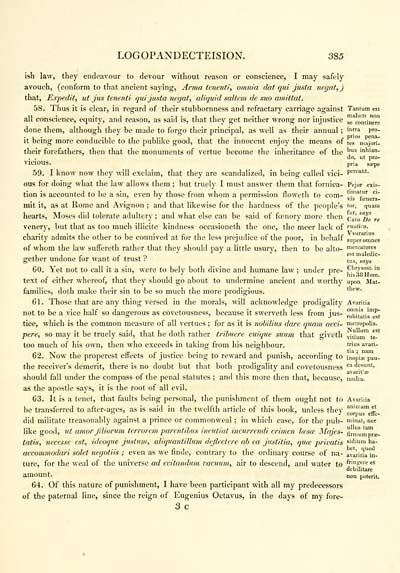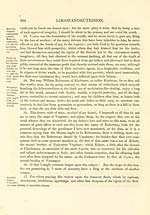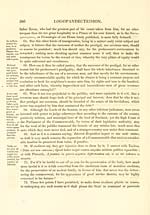Maitland Club > Works of Sir Thomas Urquhart
(431) Page 385
Download files
Complete book:
Individual page:
Thumbnail gallery: Grid view | List view

LOGOPANDECTEISION. 385
ish law, they endeavour to devour without reason or conscience, I may safely
avouch, (conform to that ancient saying, Anna tenenti, omnia dat qui justa negat,)
that, Erpedit, ut jus tenenti qui justa negat, aliquid saltern de suo amittat.
58. Thus it is clear, in regard of their stubbornness and refractary carriage against Tantum est
all conscience, equity, and reason, as said is, that they get neither wrong nor injustice se cont j ncre
done them, although they be made to forgo their principal, as well as their annual ; i "f ra P™-
it being more conducible to the publike good, that the innocent enjoy the means of tes ma jori-
their forefathers, then that the monuments of vertue become the inheritance of the 1 ? us inhian -
. . do, ut pro-
V1C10US. pria gape
59. I know now they will exclaim, that they are scandalized, in being called vici- P ereant -
ous for doing what the law allows them ; but truely I must answer them that fornica- Pejor exis-
tion is accounted to be a sin, even by those from whom a permission fioweth to com- ^™ a J- ur Cl "
mit it, as at Rome and Avignon ; and that likewise for the hardness of the people's tor, quam
hearts, Moses did tolerate adultery ; and what else can be said of foenory more then clto"^ re
venery, but that as too much illicite kindness occasioneth the one, the meer lack of rustira.
charity admits the other to be connived at for the less prejudice of the poor, in behalf su'peromnes
of whom the law suffereth rather that they should pay a little usury, then to be alto- mercatores
gether undone for want of trust ? tuS) says
60. Yet not to call it a sin, were to bely both divine and humane law ; under pre- , chr „ ys °f " in
i i • his38Hom.
text of either whereof, that they should go about to undermine ancient and worthy upon Mat-
families, doth make their sin to be so much the more prodigious.
61. Those that are any thing versed in the morals, will acknowledge prodigality Avaritia
not to be a vice half so dangerous as covetousness, because it swerveth less from jus- ""v,", 8 ,' 1 " 1 '!
tice, which is the common measure of all vertues ; for as it is nobilius dare quam acci- metropolis.
pere, so may it be truely said, that he doth rather tribuere caique suum that giveth iiti nm t e!
too much of his own, then who exceeds in taking from his neighbour. t™" 8 avari-
62. Now the properest effects of justice being to reward and punish, according to inopia; pau-
the receiver's demerit, there is no doubt but that both prodigality and covetousness cad f sunt >
should fall under the compass of the penal statutes ; and this more then that, because, multa.
as the apostle says, it is the root of all evil.
63. It is a tenet, that faults being personal, the punishment of them ought not to Avaritia
be transferred to after-ages, as is said in the twelfth article of this book, unless they ammam £f
° J corpus enc-
did militate treasonably against a prince or commonweal ; in which case, for the pub- niinat, nee
like good, ut amor Jiliorum terrorem parentibus ineiitiat incurrendi crimen Icesce Majes- j,^™.
tatis, necesse est, ideoque justum, aliquantillum deflectere ab ea justitia, qua> pricatis sidium ha-
accommodari solet negotiis ; even as we finde, contrary to the ordinary course of na- avaritia in-
ture, for the weal of the universe ad evitandum vacuum, air to descend, and water to frin s er e et
debilitare
amount. non potent,
64. Of this nature of punishment, I have been participant with all my predecessors
of the paternal line, since the reign of Eugenius Octavus, in the days of my fore-
3 c
ish law, they endeavour to devour without reason or conscience, I may safely
avouch, (conform to that ancient saying, Anna tenenti, omnia dat qui justa negat,)
that, Erpedit, ut jus tenenti qui justa negat, aliquid saltern de suo amittat.
58. Thus it is clear, in regard of their stubbornness and refractary carriage against Tantum est
all conscience, equity, and reason, as said is, that they get neither wrong nor injustice se cont j ncre
done them, although they be made to forgo their principal, as well as their annual ; i "f ra P™-
it being more conducible to the publike good, that the innocent enjoy the means of tes ma jori-
their forefathers, then that the monuments of vertue become the inheritance of the 1 ? us inhian -
. . do, ut pro-
V1C10US. pria gape
59. I know now they will exclaim, that they are scandalized, in being called vici- P ereant -
ous for doing what the law allows them ; but truely I must answer them that fornica- Pejor exis-
tion is accounted to be a sin, even by those from whom a permission fioweth to com- ^™ a J- ur Cl "
mit it, as at Rome and Avignon ; and that likewise for the hardness of the people's tor, quam
hearts, Moses did tolerate adultery ; and what else can be said of foenory more then clto"^ re
venery, but that as too much illicite kindness occasioneth the one, the meer lack of rustira.
charity admits the other to be connived at for the less prejudice of the poor, in behalf su'peromnes
of whom the law suffereth rather that they should pay a little usury, then to be alto- mercatores
gether undone for want of trust ? tuS) says
60. Yet not to call it a sin, were to bely both divine and humane law ; under pre- , chr „ ys °f " in
i i • his38Hom.
text of either whereof, that they should go about to undermine ancient and worthy upon Mat-
families, doth make their sin to be so much the more prodigious.
61. Those that are any thing versed in the morals, will acknowledge prodigality Avaritia
not to be a vice half so dangerous as covetousness, because it swerveth less from jus- ""v,", 8 ,' 1 " 1 '!
tice, which is the common measure of all vertues ; for as it is nobilius dare quam acci- metropolis.
pere, so may it be truely said, that he doth rather tribuere caique suum that giveth iiti nm t e!
too much of his own, then who exceeds in taking from his neighbour. t™" 8 avari-
62. Now the properest effects of justice being to reward and punish, according to inopia; pau-
the receiver's demerit, there is no doubt but that both prodigality and covetousness cad f sunt >
should fall under the compass of the penal statutes ; and this more then that, because, multa.
as the apostle says, it is the root of all evil.
63. It is a tenet, that faults being personal, the punishment of them ought not to Avaritia
be transferred to after-ages, as is said in the twelfth article of this book, unless they ammam £f
° J corpus enc-
did militate treasonably against a prince or commonweal ; in which case, for the pub- niinat, nee
like good, ut amor Jiliorum terrorem parentibus ineiitiat incurrendi crimen Icesce Majes- j,^™.
tatis, necesse est, ideoque justum, aliquantillum deflectere ab ea justitia, qua> pricatis sidium ha-
accommodari solet negotiis ; even as we finde, contrary to the ordinary course of na- avaritia in-
ture, for the weal of the universe ad evitandum vacuum, air to descend, and water to frin s er e et
debilitare
amount. non potent,
64. Of this nature of punishment, I have been participant with all my predecessors
of the paternal line, since the reign of Eugenius Octavus, in the days of my fore-
3 c
Set display mode to: Large image | Transcription
Images and transcriptions on this page, including medium image downloads, may be used under the Creative Commons Attribution 4.0 International Licence unless otherwise stated. ![]()
| Publications by Scottish clubs > Maitland Club > Works of Sir Thomas Urquhart > (431) Page 385 |
|---|
| Permanent URL | https://digital.nls.uk/82504293 |
|---|

